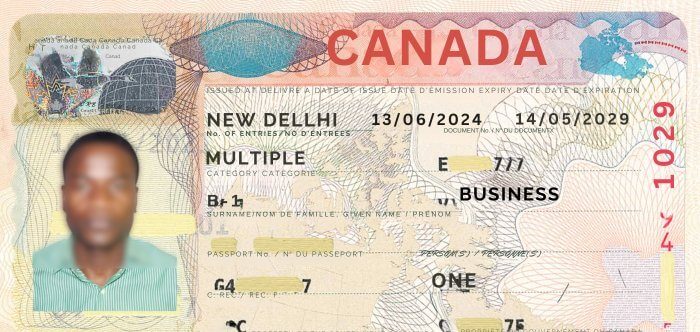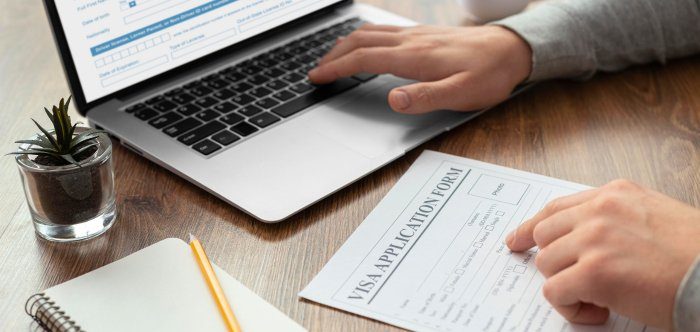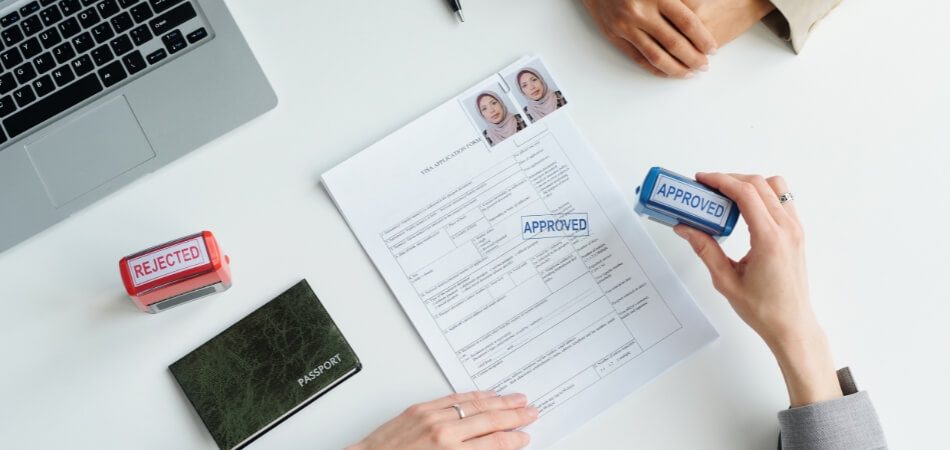Applying for a conference visa is the first step in journeying toward an international professional gathering, where ideas are exchanged and networks are expanded. Once the application is submitted, the pressing question arises: “How do I know if my conference visa is approved?”
There are simple ways to find out. To check the status, contact the embassy or consulate where you submitted your application. Additionally, keep an eye on your email and postal mail for any notifications regarding your visa approval or denial.
For detailed guidance on tracking your visa status and what steps to take next, continue reading this article to ensure you stay informed and prepared.
What is a Conference Visa?
A Conference Visa serves as a key for professionals and academics to unlock doors to global knowledge exchange forums. It is specifically designed for individuals attending conferences, seminars, or workshops abroad. This visa category facilitates the merging of minds and ideas across international borders.
Securing a conference visa is essential for those aiming to present papers, network with peers, or absorb new information. It remains valid for the duration of the event, ensuring attendees can fully engage with the agenda. After the event, holders typically must return to their home countries, enriched with the experience and insights gained.
Types of Conference Visas
It is crucial to understand the visa options available to be able to attend international conferences. Each type has been tailored to different professional gatherings. Understanding these categories ensures you can select the visa best suited to your conference needs.
Short-Term Conference Visa
For brief events like seminars or workshops, the Short-Term Conference Visa is ideal. Applicants must show their intent to attend a specific event. The validity is limited, covering just the conference period. Post-event, visa holders are expected to leave promptly.
Academic Conference Visa
Researchers and scholars benefit from the Academic Conference Visa. This type accommodates longer events such as symposia or academic congresses. It’s tailored for the intellectual community seeking to share pioneering research. Applicants need proof of their educational or professional standing.
Business Conference Visa
Corporate professionals seeking industry-specific conferences apply for the Business Conference Visa. It facilitates attendance at trade shows, corporate seminars, and industry conventions. This visa is distinct from regular business travel visas, focusing on event participation. Validity is tied to the event’s schedule.
Cultural Exchange Conference Visa
The Cultural Exchange Conference Visa targets arts and cultural event attendees. It’s for conferences that promote cultural heritage and artistic endeavors. Visa recipients are often performers, artists, or cultural ambassadors. This visa encourages cultural collaboration and global dialogue.
Selecting the appropriate conference visa is a strategic step in your travel preparation. By matching your purpose with the right visa type, you ensure a smooth journey towards your international engagement, such as the Global Conference in Canada. Remember to apply well in advance and to carry all necessary documentation to the event.
Requirements for Getting a Conference Visa
Securing a conference visa is a pivotal step for professionals aiming to engage with global peers. Knowing the requirements can streamline the application process. Here, we outline the essentials needed to embark on your international conference journey.
- Valid Passport: Your passport must be valid for at least six months beyond your conference dates. It should also have blank pages for stamping by immigration.
- Conference Details: Evidence of conference registration is crucial; this includes confirmation emails or letters from the organizers. You’ll need to provide the event’s agenda and your role in it.
- Proof of Accommodation: Confirmation of hotel bookings or an invitation from hosts must be shown. This assures the consulate you have a place to stay during your visit.
- Financial Stability: Bank statements or financial records prove you can support yourself during the trip. Authorities require this to ensure you’re not a burden on their resources.
- Return Ticket: You must have a booked return flight to indicate your intent to return home. Consulates look for this as a sign of your temporary stay.
- Letter from Employer: A letter from your employer grants credibility, stating the purpose and duration of your visit. If self-employed, official business documents can be substituted.
In essence, each document you submit moves you closer to gaining your conference visa. Ensure accuracy and completeness to facilitate a smoother application process. With these items in order, you’re well on your way to obtaining approval for your academic or professional venture abroad.
How to Apply for a Visa for a Conference?
Getting the right visa to attend a conference is the first step. The application process for a conference visa may seem daunting, but breaking it down into steps simplifies the task. Follow this structured guide to apply for your conference visa with confidence.
Step 1: Identifying the Appropriate Visa Category
Determine the specific type of conference visa that aligns with the nature of your event. The category chosen impacts the documentation you will need to provide, so select carefully.
Step 2: Completing the Visa Application Form
Access and fill out the relevant visa application form from the official embassy or consulate website. Accuracy is key, so double-check all details before submission.
Step 3: Collecting Necessary Documentation
Gather all the required documents, such as your valid passport, conference registration, accommodation proof, and financial evidence. Additionally, include proof of previous trips abroad for conference visa applications, if applicable. These documents should corroborate the information supplied in your visa application.
Step 4: Scheduling a Visa Interview
Arrange for an interview appointment at the embassy or consulate, typically through their online scheduling system. Ensure you choose a date that allows sufficient time for visa processing before your conference.
Step 5: Attending the Visa Interview
Appear for your visa interview with all documents in hand, ready to clearly discuss your conference participation. Punctuality and formality during this step are crucial.
Step 6: Awaiting Visa Processing
Once your interview is complete, await the visa processing. Patience is essential here, and you should monitor your application status if the facility is provided.
Obtaining a conference visa involves a series of well-defined steps. By following this guide meticulously, you stand a good chance of a hassle-free application experience. Start early to navigate each stage with ample time, and look forward to a successful conference trip.
How Do I Know if My Conference Visa is Approved?
Knowing the status of your visa approval is essential when you’re planning on attending an international conference. You can ease your worries by understanding the process involved. Here’s how you can check your conference visa status:
Contact the Embassy or Consulate
The first step is to reach out to the embassy or consulate where you applied. They can provide up-to-date information on your visa status. Usually, they have specific contact numbers or email addresses for inquiries. It’s essential to have your application details ready when you contact them.
Check Your Email Regularly
After submitting your application, regularly check your email for updates from the embassy. Notifications about your visa status are often sent via email. Ensure your email settings allow messages from the embassy to avoid missing important updates. Promptly respond if any additional information is requested.
Monitor Your Postal Mail
Some embassies might send visa status updates through postal mail, especially if they require original documents. Keep an eye on your mailbox for any correspondence from the embassy. If you receive mail, follow the instructions provided carefully. It’s advisable to keep all related documents organized and accessible.
Use Online Tracking Services
Many embassies offer online tracking services where you can monitor your visa application status. Visit the official website of the embassy and enter your application reference number. These services provide real-time updates on your application’s progress. Always use official websites to avoid scams.
Visit the Embassy in Person
If online and phone inquiries are insufficient, you can visit the embassy or consulate in person. Bring your application receipt and any identification required. Speaking directly with the staff can sometimes provide more detailed information. It’s important to schedule an appointment beforehand.
Follow Up if Delayed
If you haven’t received any updates within the expected timeframe, don’t hesitate to follow up. Delays can occur, and checking in ensures your application is not overlooked. Contact the embassy again with your application details. Staying proactive helps in keeping your plans on track.
What Can You Do to Quickly Get the Conference Visa Approved?
Securing a conference visa quickly requires careful planning and attention to detail. Implementing specific strategies can significantly speed up the approval process. Here are the essential steps you should take.
- Submit Early Applications: Apply for your visa well in advance to avoid last-minute issues. Early submission allows time to resolve any unforeseen delays.
- Prepare Complete Documentation: Ensure all required documents are accurate and properly filled out. Missing or incorrect paperwork can delay your visa approval.
- Provide a Clear Itinerary: Include a detailed itinerary of your conference participation, travel, and accommodation plans. A well-organized schedule can facilitate faster processing.
- Show Proof of Ties: Demonstrate strong ties to your home country, such as employment or family commitments. This indicates your intent to return after the conference.
- Follow Embassy Guidelines: Adhere strictly to the embassy’s guidelines for your visa category. Compliance with their instructions helps prevent unnecessary setbacks.
- Opt for Expedited Processing: If available, choose expedited processing by paying additional fees. This option can significantly reduce the waiting period.
- Consult an Expert: Seek advice from a visa consultant, especially if you encounter issues. They can offer effective conference visa delay solutions to expedite the process.
- Stay Responsive: Promptly respond to any requests from the embassy for additional information. Timely communication ensures your application moves forward without delays.
Last Words
A good understanding of the process of checking your visa status is essential if you plan to attend an international conference. By knowing how do I know if my conference visa is approved, you can ease any concerns and ensure timely preparations.
Key steps include contacting the embassy, regularly checking email and postal mail, and utilizing online tracking services. Staying proactive, especially by following up on any delays, ensures your plans remain on track. Being informed and responsive allows for a smoother journey toward your international engagement.








